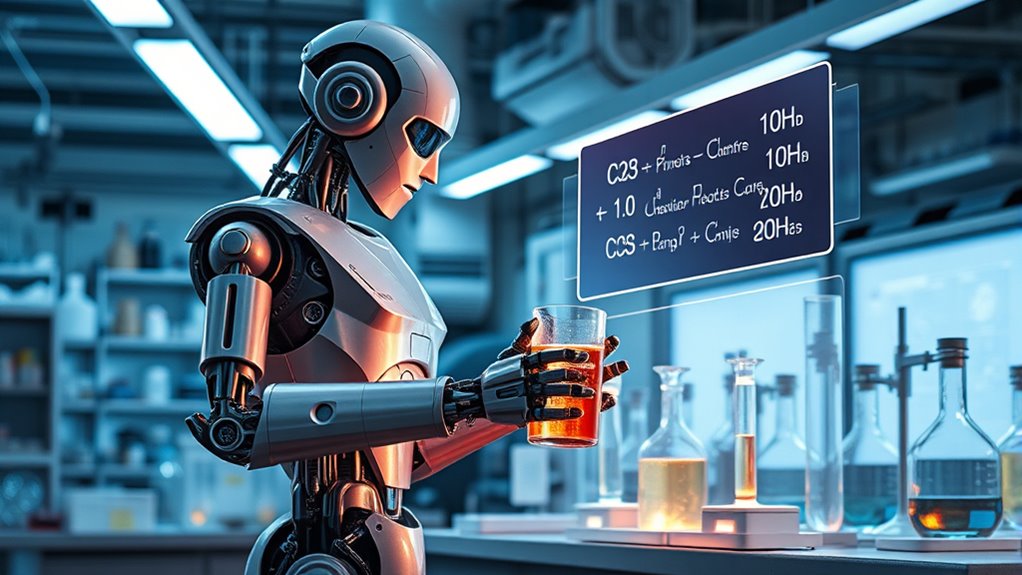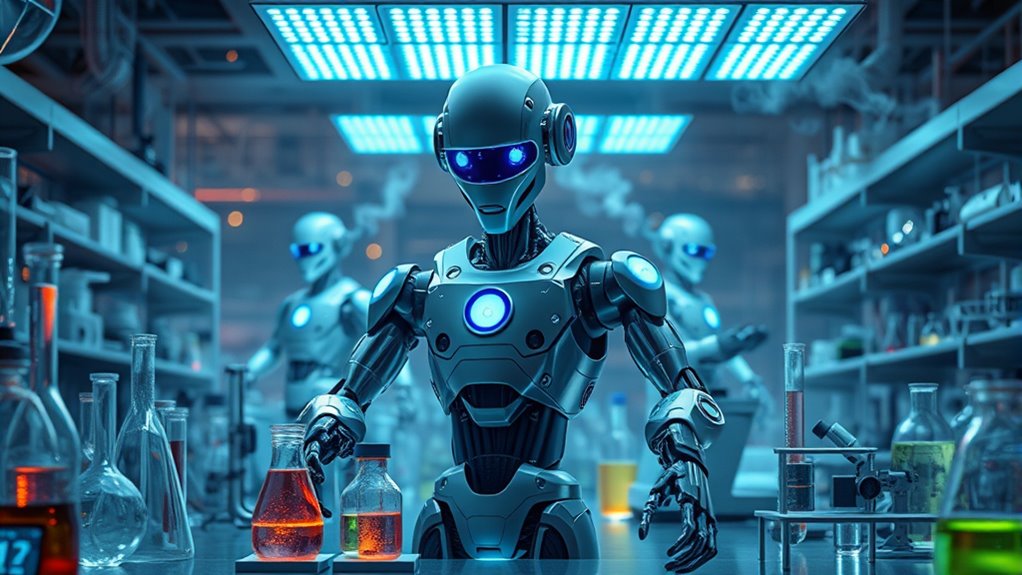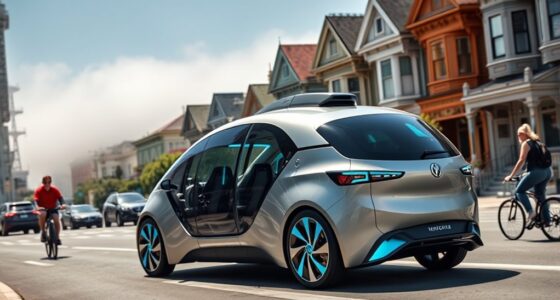An AI-powered robot scientist has independently achieved a major breakthrough in chemistry, showcasing how automation combined with artificial intelligence is transforming research. It designs experiments, analyzes data, and makes discoveries with minimal human input, speeding up scientific progress. While this raises questions about ethics and oversight, it also highlights the potential to improve accuracy and efficiency. If you want to understand how this innovation impacts science and society, keep exploring further.
Key Takeaways
- An AI-powered robot scientist independently designed and conducted chemistry experiments, leading to a significant breakthrough without human intervention.
- The system utilized advanced AI algorithms to select variables, run experiments, and analyze data autonomously.
- This automation accelerates discovery cycles, enabling rapid identification of novel chemical compounds or reactions.
- Ethical safeguards and transparency measures were incorporated to ensure responsible and trustworthy scientific advancements.
- The breakthrough demonstrates the potential of autonomous AI systems to revolutionize chemistry research and scientific discovery.

Imagine a robot scientist equipped with artificial intelligence that can design experiments, analyze data, and make discoveries faster than any human researcher. This groundbreaking technology exemplifies the power of laboratory automation, where machines handle complex scientific tasks with minimal human intervention. As an observer, you might marvel at how seamlessly these robots operate, executing experiments with precision and speed that surpass traditional methods. However, with this remarkable progress come important questions about automation ethics—how these systems should be developed, deployed, and monitored to ensure responsible scientific advancement.
In the domain of laboratory automation, the robot scientist functions independently, selecting variables, running tests, and interpreting results without constant human oversight. This autonomy accelerates research cycles, allowing scientists to explore multiple hypotheses simultaneously and identify promising compounds or reactions swiftly. Such efficiency pushes the boundaries of traditional experimentation, opening doors to discoveries that might have taken years through manual efforts. Yet, it also raises concerns about transparency and accountability. When a machine makes a decision or identifies a new chemical pathway, who is responsible if something goes wrong? Automation ethics emphasizes the importance of designing systems with safeguards, ensuring that these intelligent machines operate within ethical frameworks that prioritize safety, reproducibility, and fairness. Additionally, implementing robust safety protocols can help prevent unintended consequences in autonomous research.
You should also consider the implications for the scientific community. While laboratory automation enhances productivity, it challenges established roles and workflows. Researchers need to adapt by understanding how these AI-driven systems function and how to interpret their outputs critically. It’s crucial to maintain human oversight, not just for quality control but also to uphold ethical standards. The integration of AI in scientific research demands transparency in algorithms and decision-making processes, so that findings are trustworthy and reproducible. This transparency is fundamental to building confidence in automated experiments and ensuring that automation ethics guide the development and deployment of such systems. Additionally, understanding color accuracy and how it impacts data interpretation can help refine experimental results and improve reliability.
Moreover, as these robot scientists make autonomous discoveries, you might wonder about the broader societal impacts. Will automation replace human scientists, or will it serve as a tool to augment human ingenuity? The answer lies in responsible implementation—balancing technological advancement with ethical considerations that protect scientific integrity and societal values. Responsible laboratory automation involves continuous dialogue among scientists, ethicists, and policymakers to establish guidelines that govern the use of AI in research. Additionally, fostering public understanding about the capabilities and limitations of AI-driven science can help build societal trust and promote responsible adoption. Ultimately, this collaboration will help harness the immense potential of AI-powered robot scientists, ensuring their contributions are safe, ethical, and beneficial for all. Adhering to ethical standards in AI development is essential to foster trust and long-term progress in scientific innovation.
Frequently Asked Questions
How Does the Robot Scientist Ensure Experimental Safety?
When considering how a robot scientist guarantees experimental safety, you should focus on its use of advanced safety protocols. It employs chemical safety measures, such as sensors and automated shutdowns, to detect hazards early. Additionally, it mitigates errors through precise programming and real-time monitoring, reducing human mistakes. This combination of safety features and error mitigation strategies guarantees that experiments are conducted securely, protecting both the robot and the environment.
Can the Robot Scientist Adapt to New Research Fields?
Imagine a robot scientist standing at a vast, ever-changing landscape of research fields. With its machine learning capabilities, it can recognize patterns and adapt to new areas, like a traveler adjusting to new terrains. By constantly validating data, it guarantees accuracy and relevance. So yes, it can adapt to new research fields, learning and evolving through ongoing data validation, making it a versatile tool across diverse scientific domains.
What Are the Limitations of AI in Scientific Discovery?
You should recognize that AI in scientific discovery faces limitations like ethical concerns and bias. You must guarantee the AI’s decisions are transparent and ethically sound, avoiding biases that could skew results. While AI accelerates research, it can lack human intuition and contextual understanding. To overcome these issues, you need to focus on bias mitigation strategies and establish guidelines that prioritize ethical considerations, ensuring responsible and reliable scientific advancements.
How Is Data Integrity Maintained During Autonomous Experiments?
Imagine trusting a robot to handle your data—ironic, right? You guarantee data integrity through rigorous data verification processes, like cross-checking results and monitoring for anomalies. Ethical considerations come into play when safeguarding against bias or errors that could mislead discoveries. By implementing strict protocols and audits, you keep autonomous experiments reliable, ensuring that even in a machine’s hands, scientific integrity remains intact amid the marvels of automation.
Will Robot Scientists Replace Human Chemists Entirely?
You might wonder if robot scientists will fully replace human chemists. While AI collaboration enhances research efficiency, robot ethics remain vital to ensure responsible use. Robots can handle repetitive tasks and data analysis, but human creativity and judgment are irreplaceable. So, rather than full replacement, expect a future where robots support and augment human chemists, fostering a partnership that advances science ethically and effectively.
Conclusion
Imagine you’re watching a tiny pioneer chart uncharted waters, discovering new islands of knowledge without hesitation. That’s what this AI-powered robot scientist is doing—exploring the vast ocean of chemistry on its own. It’s like handing a compass to a brave explorer who finds a hidden treasure, revolutionizing science as we understand it. As this robot ventures further, it’s clear: the future of discovery belongs to those daring enough to harness such groundbreaking technology.









